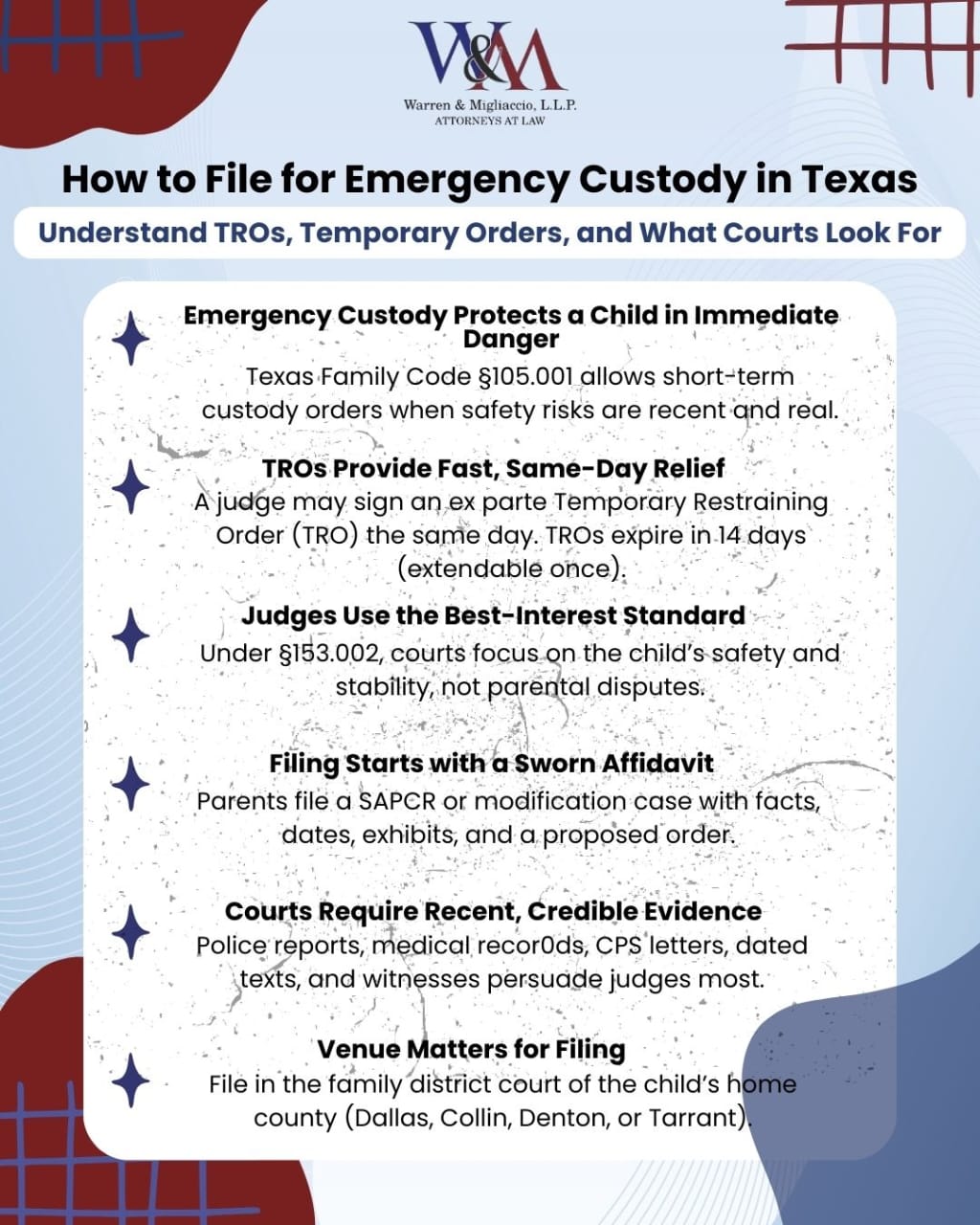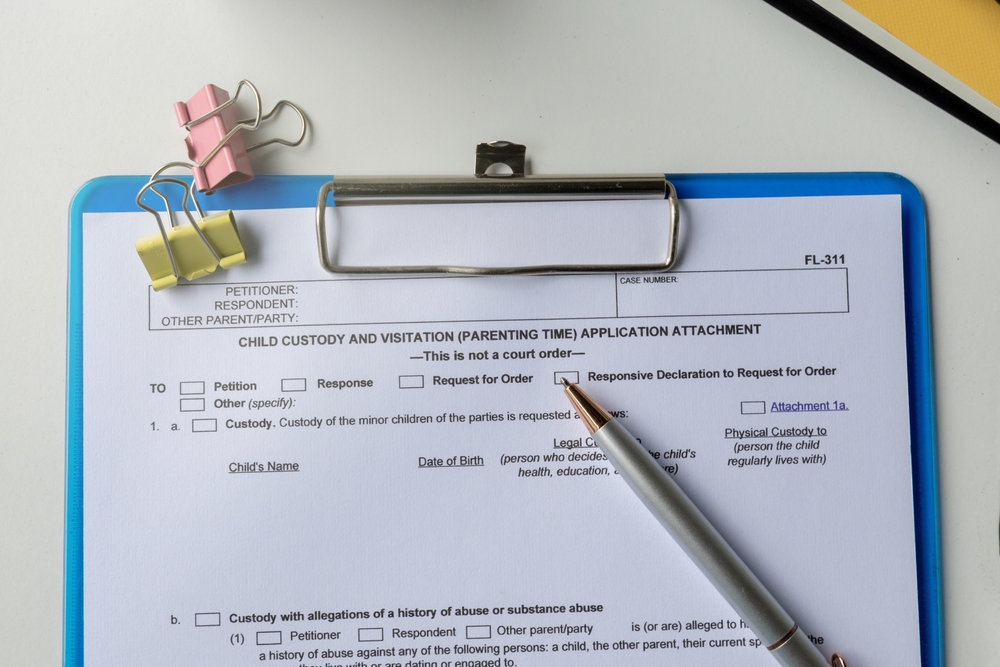In Texas, emergency custody is a short-term court order that protects a child in immediate danger. Parents file a Motion for Temporary Orders, often paired with a same-day ex parte TRO, and judges usually hold a follow-up hearing within about 14 days.
Emergency custody in Texas is a short‑term court order that protects a minor child in immediate danger. In DFW, parents file a Motion for Temporary Orders. Many cases also include an ex parte Temporary Restraining Order (TRO). Judges use the best‑interest standard and often set a hearing within about 14 days.
Quick Answer: How do I file for emergency custody in Texas?
In Texas, parents must urgently file a SAPCR with a sworn affidavit and request Temporary Orders; courts often schedule a hearing within 14 days.
- File a SAPCR or modification petition with affidavit
- Request an ex parte TRO citing Texas Family Code §105.001
- Prepare evidence and attend the follow-up hearing
Emergency Custody: 60‑Second Overview (How to File for Emergency Custody)
“Emergency custody” in Texas is temporary relief granted through Temporary Orders to protect a child’s safety and welfare. An emergency custody order is the court’s official document granting temporary custody to protect the child in urgent situations. Under Texas Family Code §105.001, a judge may order short‑term conservatorship, support, safe exchanges, and supervised visits. Citation: Texas Statutes.
Judges must act in the best interest of the child under §153.002. Clear, recent facts carry the most weight. Citation: Texas Statutes.
For urgent safety, a court may sign an ex parte TRO the same day. Under TRCP 680, a TRO expires in 14 days (extendable once) and the court must set an early court hearing. Citation: Texas Courts.
If family violence is at issue, a temporary ex parte protective order can also issue for up to 20 days and be extended. Many cases use both a TRO and a protective order. Child Protective Services may conduct investigations that impact emergency custody decisions. Citation: Texas Statutes.
When Emergency Custody Is Appropriate (and When Not)
Emergency custody is appropriate when a child faces immediate threats to their safety, such as those listed below.
Emergencies include:
- Recent violence or threats toward the child or a parent
- Severe neglect or immediate danger of harm
- Substance abuse that puts the child at risk
- Stalking, harassment, or abduction threats
Not emergencies: routine parenting disputes, small schedule issues, or disagreements about diet or bedtime.
A TRO does not change custody forever. It keeps the child safe and preserves the status quo until the hearing. Emergency custody orders may automatically expire unless a follow-up hearing is conducted. Citations: Texas Law Help; Texas Courts.
Bottom line: If risk is real and recent, move now.
Need-to-Know Highlights
- Emergency custody is temporary protection until a hearing
- TROs last 14 days; protective orders last 20 days
- Judges apply the “best interest of the child” standard
- Filing requires a sworn affidavit with recent facts
- Local county rules and standing orders must be followed

How to File for Emergency Custody in DFW (Step‑by‑Step)
1) Confirm jurisdiction and venue
Texas is usually the child’s home state if the child lived here 6+ m) Confirm jurisdiction and venue
Texas is usually the child’s home state if the child lived here 6+ months. If another state has a case, Texas can still act under UCCJEA temporary emergency jurisdiction when the child is in Texas and needs protection. Citations: FindLaw; Texas Statutes.
2) Draft and file your case + emergency motion
- File an Original SAPCR (or a modification if a prior order exists) (this filing is also known as a petition for emergency custody).
- Attach a sworn affidavit with facts and dates.
- Add exhibits (texts, photos, police or medical records).
- Request an ex parte TRO if safety cannot wait. Cite §105.001 and TRCP 680. Include proposed orders. Citations: Texas Statutes; Texas Courts.
Related Guide: How to Win an Ex Parte Hearing in Texas
3) E‑file
The child custody attorney must e‑file via eFileTexas. Self‑represented parents may e‑file or file in person. E‑file lets you submit after hours and get instant file‑stamps. Citations: eFile Texas; Texas Courts.
4) Service and scheduling
If the court grants ex parte relief, expect a quick hearing date. Otherwise, serve the other parent and set the hearing per TRCP 680. Citation: Texas Courts.
5) Prepare for the hearing
Organize exhibits and witnesses. Bring a safety plan (supervised exchanges, neutral sites, testing). Carry printed and digital copies. Use clear timelines.
6) Attend the hearing
Testify about recent risk and why your plan protects the child. Ask for specific terms (supervised visits, drug testing, counseling). Citation: Texas Statutes.
Local filing notes (DFW)
- Dallas County: George L. Allen, Sr. Courts Building, 600 Commerce St., Dallas. Tab and label exhibits for the duty judge. Many urgent TROs can be walked to the duty judge the same day.
- Collin County: Russell A. Steindam Courts Building, 2100 Bloomdale Rd., McKinney. Bring USB drives and printed photo exhibits.
- Denton County: Courts Building, 1450 E. McKinney St., Denton. Standing orders effective Feb. 27, 2025.
- Tarrant County: Family Law Center, 200 E. Weatherford St., Fort Worth. Citations: Dallas County; Collin County; Denton County; Tarrant County.
Your path forward starts with clear, fast action.
Case Study: Emergency Custody Granted After a Dangerous Exchange
A North Texas parent rushed in after a late-night exchange turned frightening. The other parent smelled of alcohol, sent threats, and the child sobbed in the back seat. Our client felt overwhelmed and afraid. This type of crisis is one we see often.
We acted quickly. Our team preserved the texts and call log, collected photos, and drafted a sworn affidavit. Next, we built a safe-exchange plan and e-filed a Motion for Temporary Orders with an ex parte TRO under §105.001 and TRCP 680.
The judge signed the TRO that morning. At the follow-up hearing, we presented a timeline, called witnesses, and requested drug testing along with supervised visitation. The court granted our client temporary managing conservatorship and required exchanges at a monitored center.
Takeaway: When a child faces immediate risk, swift action backed by solid evidence can secure emergency custody and provide protection while the larger case continues.
What Texas Courts Consider (Best‑Interest Factors)
Best interest under §153.002 guides every choice. Judges focus on safety and stability:
- Immediate risk: injuries, threats, intoxication, recent danger
- Family violence: any protective orders or reports
- Home stability: safe housing, school continuity, support network
- Parent’s ability: ability to provide a stable and safe environment for the child
- Substance abuse: test results, arrests, observed impairment
- UCCJEA issues: other‑state cases, emergency jurisdiction
- Standing orders: Dallas/Collin/Denton rules; follow them Citations: Texas Statutes; Dallas County; Collin County; Denton County.
We keep the court on facts, not feelings.

Evidence Judges Find Persuasive (and How to Present It)
Bring recent, credible proof that directly supports the claims made in your motion or affidavit:
- Digital: photos, videos, texts, and voicemails with dates and times; social media posts; GPS‑tagged images
- Official records: police reports, medical records, CPS letters, school notes
- Witnesses: teachers, neighbors, family members
- Safety plan: supervised exchanges, neutral pickup sites, third‑party transport
- Substance abuse documentation: drug test results, treatment records Citation: Texas Law Help.
Tip: Screenshots plus sworn statements beat opinions.
Ex Parte Options: TRO vs. Protective Order vs. Temporary Orders
| Tool | When Used | Duration | What It Can Do |
|---|---|---|---|
| TRO (TRCP 680) | Immediate, ex parte safety relief | Up to 14 days; quick hearing required | Keep child safe; restrict conduct; cannot grant final custody |
| Temp. Ex Parte Protective Order (TFC Ch. 83) | Clear danger of family violence | Up to 20 days, extendable | Keep abuser away; can exclude from residence |
| Temporary Orders (§105.001) | Short-term custody plan after hearing | Until further order | Temporary conservatorship, possession, support |
Citations: Texas Courts; Texas Statutes; Texas Law Help.
A temporary order is a provisional ruling issued by the court that remains in effect until a final judgment or a further court order is made.
Jurisdiction, Venue & Standing
- UCCJEA home state: Texas is home state if the child lived here 6+ months.
- Emergency jurisdiction: Texas may act if the child is in Texas and needs protection, depending on the circumstances that present an immediate risk to the child, even when another state is the home state. Courts must communicate.
- Continuing exclusive jurisdiction: A Texas court with a final order usually keeps jurisdiction.
- Standing orders: Apply automatically in Dallas, Collin, and Denton. Follow them. Citations: FindLaw; Texas Statutes; Dallas County; Collin County; Denton County.
Right court. Right relief. And Right now.
After You File: Timeline & Hearing
TRO clock: A TRO expires in ≤14 days unless extended. Set your application for the earliest hearing.
Hearing: Short testimony. Exhibits. Witnesses. The judge may ask direct questions. These custody and divorce proceedings are designed to address urgent safety concerns and determine appropriate temporary arrangements. Emergency custody orders typically last until a follow-up hearing can be scheduled to address long-term custody arrangements.
Outcomes:
- Temporary managing/possessory conservatorship
- Supervised visits or neutral exchanges
- Drug testing, counseling, or classes
- Temporary child support and communication limits Citations: Texas Courts; Texas Law Help; Texas Statutes.
Appeals & Review of Temporary Orders: Temporary orders are not typically appealable right away. Review is often by mandamus in rare cases or later appeal after the final judgment. Citations: Texas Statutes; Texas practice (mandamus principle reflected in Texas resources).

Temporary Custody Orders: Terms, Compliance, and Enforcement
Common terms:
- Temporary managing conservatorship (who decides)
- Possession schedule and restrictions
- Drug testing or alcohol monitoring
- No‑contact or non‑disparagement rules
- Safe‑exchange locations and supervised centers
Compliance matters. Violations risk enforcement or contempt. Track all exchanges, visits, and compliance with the order to ensure proper documentation. Document issues right away.
Enforcement & Remedies:
- Contempt: fines, jail time, makeup visitation, attorney’s fees
- **Writs:**habeas corpus and pick‑up orders for fast return of a child
- Modifications: seek changes under Chapter 156 after a material change Citations: Texas Statutes; Texas practice on enforcement.
Edge Cases
- Non‑parent filings: Texas presumes a fit parent acts in the child’s best interests. Non‑parents must meet strict standing and overcome this presumption (In re C.J.C.). Legal advice is key.
- Interstate conflicts: Texas can act under temporary emergency jurisdiction while the home state handles long‑term orders; courts coordinate. Emergency custody is temporary and does not determine permanent custody, which is decided in later proceedings.
- CPS vs. private action: CPS removals follow Chapter 262 with a 14‑day adversary hearing. Private SAPCRs are different.
- Military, relocation, hidden‑child: Safety and jurisdiction drive the short‑term plan. Pick‑up orders and habeas can help when a child is concealed.
Citations: Texas Statutes; FindLaw; Justia Law.
Common Mistakes We’ve Seen
- Filing in the wrong county or leaving out UCCJEA facts
- Screenshots with no dates or sender info
- Violating standing orders (travel, school, insurance)
- Over‑alleging without proof; venting on social media
- Forgetting to serve the other parent or to set the early hearing
Promptly resolve any mistakes or missing information to avoid delays in your case. Do not hesitate to reach out to our child custody lawyers for legal help. We offer a free consultation to answer your legal questions and discuss your situation.
Citations: Texas Courts; Texas Law Help; Dallas/Collin/Denton standing orders.
Micro‑script: Strong facts beat strong feelings.
Texas Case‑Law Spotlight
In re C.J.C., 603 S.W.3d 804 (Tex. 2020).Texas Supreme Court reaffirmed the fit‑parent presumption. Non‑parents face a high bar. Citations: Justia Law.
Daulton v. Daulton (UCCJEA & Emergency Jurisdiction).Texas issued a TRO when children were brought here from another state. In such divorce cases, the court must determine whether the circumstances justify emergency custody and how long it should last. Texas acted for safety under §152.204, then coordinated with the home state for long‑term decisions. This shows how emergency power protects children now while the home state controls the final order. Citations: Texas Statutes; Justia Law.
Quick Answers: Micro Q&A
- What is emergency custody? A short-term order to protect a child in danger via Temporary Orders.
- How fast can relief happen? A judge may sign an ex parte TRO the same day; a hearing follows fast.
- Who decides? A DFW family district judge using the best-interest standard.
- Can I e-file myself? Yes. Attorneys must e-file; pro se may e-file or file in person.
- How do I file for emergency custody? First, understand the specific requirements and procedures for your county before filing. Then, prepare your documents and file with the appropriate court.
- How long does a TRO last? Up to 14 days, extendable once.
- Protective order length? Up to 20 days initially, extendable.
- Will the other parent be notified? Yes. Ex parte relief is brief; a noticed hearing follows.
- What evidence helps most? Recent police/medical records, dated texts/photos, credible witnesses.
- Prior order exists? File a modification and seek temporary relief.
- Is a TRO the same as emergency custody? No. A TRO is short-term. Temporary Orders set the interim plan. Citations: Texas Courts; Texas Statutes; eFile Texas; Texas Law Help.
Frequently Asked Questions
Filing & Eligibility
How do I file for emergency custody in Texas?
File or modify a SAPCR in family court with a sworn affidavit detailing recent facts. If safety can’t wait, request ex parte relief (TRO) with proposed Temporary Orders.1. E-file or file with the clerk2. Serve the other parent (unless ex parte)3. Early hearing (≈14 days)4. Bring evidence and a safety planTo ensure you are following the correct divorce process for your situation, talk to a family law attorney about your legal options and the specific steps required in your case.
What qualifies as an emergency for a temporary custody order in Texas?
Immediate danger to the child’s health or safety, with the child’s safety being the primary concern, must be proven with recent, specific facts—not routine disputes.Examples:domestic violenceviolence or threatsintoxicated caregivingsevere neglectstalking/harassmentor credible abduction risk
TRO Timing & Duration
How fast can I get an emergency order or TRO in Texas?
Same-day TROs are possible when facts justify immediate relief. Courts set a prompt hearing (usually within 14 days). Speed improves with a clear affidavit, dated exhibits, proposed orders, and following local standing orders.
How long does a TRO last in Texas?
A TRO generally lasts up to 14 days and can be extended once. The court must set an early hearing so both sides are heard and Temporary Orders can issue.
Evidence & Hearings
What evidence helps most at an emergency custody hearing in Texas?
Courts want recent, credible, dated proof that directly addresses specific concerns about the safety or child’s welfare.Police/medical/CPS recordsDated texts, voicemails, photos, videos (authenticated)Witness statements and school notesClear safety plan (supervised exchanges, testing)
Does a TRO give me custody, or do I need Temporary Orders?
A TRO is short-term, ex parte relief that preserves safety and the status quo. Temporary Orders—issued after a noticed hearing—set interim legal custody, possession, support, and safe exchanges. In some cases, temporary custody may be granted to one parent if the circumstances require it.
What happens at an emergency custody hearing in Texas?
Expect brief testimony, organized exhibits, and judge questions about immediate risk and best interests of the child. Demonstrate your commitment to the child’s safety and well-being throughout your presentation. Ask for specific terms: supervised visits, testing, neutral exchanges, and communication limits.
Jurisdiction & Order Length
Does Texas have temporary emergency jurisdiction if another state has a case (UCCJEA)?
Yes. If the child is in Texas and needs protection, Texas can enter a temporary emergency order while coordinating with the home state for long-term decisions. It’s limited to immediate safety. Understanding how emergency jurisdiction works in interstate cases is essential to ensure the proper legal steps are followed and the child’s safety is prioritized.
How long do temporary orders last in Texas?
They remain in effect until changed by the court or replaced by the final order. Temporary orders from emergency custody hearings remain in effect until another order replaces them or the court’s final judgment is made. If facts materially change, seek modification.
Representation & Case Status
Can I file for emergency custody without a lawyer (pro se) in Texas?
Yes. Courts provide forms and you can e-file. But errors can delay relief. A child custody lawyer can draft the affidavit, assemble exhibits, handle service, and navigate local standing orders.
Can emergency custody be denied in Texas?
Yes. Judges may deny ex parte relief if evidence doesn’t show immediate danger or if a less-restrictive option protects the child. Next steps: strengthen proof and present your case at the noticed Temporary Orders hearing.
Do I need a pending divorce to file emergency custody in Texas?
No. You can file a SAPCR even if no divorce is pending. If a divorce exists, include your emergency request within that case.
Protective Orders, Costs, Venue & Compliance
Is a protective order the same as emergency custody?
No. A protective order addresses family violence (keeping an abuser away). Emergency custody orders address the child’s placement, visitation, and safety conditions. Families may pursue both when needed.
How much does it cost to file, and can I get a fee waiver?
Filing fees vary by county and case type. If you cannot afford costs, file a Statement of Inability to Afford Payment of Court Costs. Budget for service, copies, and certified orders.
Where should I file my emergency custody case in DFW?
File in the proper family district court for your county—Dallas, Collin, Denton, or Tarrant—where the child has lived 6+ months. Follow each county’s automatic standing orders from day one.
Can I withhold visitation before I file for emergency custody?
If a current order exists, not following the court order and withholding time risks contempt. If there is no court order, withholding can lead to serious legal consequences once a case is filed. The safer path is prompt filing with a sworn affidavit, requesting ex parte relief (TRO) and an early hearing, then following the court’s Temporary Orders.

Key Facts Box
- Best interest of the child governs every decision (§153.002).
- Judges can order temporary conservatorship/possession under §105.001.
- TROs last up to 14 days; early hearing required (TRCP 680).
- Ex parte protective orders last up to 20 days initially.
- Attorneys must e‑file; pro se may e‑file (eFileTexas).
- UCCJEA controls interstate custody and emergency jurisdiction.
- DFW standing orders apply automatically in several counties.
- Emergency custody orders often influence the direction of long-term custody arrangements.
Citations: Texas Statutes; Texas Courts; eFile Texas; Dallas/Collin/Denton county resources.
Glossary
- Affidavit: A written, sworn statement.
- Best Interests: Legal test that puts the child’s well‑being first.
- Conservatorship (Custody): Decision‑making rights for the child.
- Ex Parte: One‑party request without advance notice.
- Jurisdiction (UCCJEA): Which state’s court can decide custody.
- Motion for Temporary Orders: Request for short‑term custody and safety rules.
- Protective Order: Order to prevent family violence.
- SAPCR: Suit Affecting the Parent‑Child Relationship (custody case).
- Standing Orders: County rules that start when a case is filed.
- TRO: Short‑term order to preserve safety/status quo.
- Venue: The correct county for your case.
- Visitation (Possession & Access): The schedule for time with the child.
Next Steps
Call (888) 584‑9614 or contact us online for a free consultation. Our experienced child custody attorneys help North Texas families in Dallas, Collin, Denton, Rockwall, and Tarrant counties. We offer rapid risk assessment, filing strategy, evidence plans, and hearing prep.
Since 2006, Warren & Migliaccio has protected what matters most for Texas families. We move fast. We file clean affidavits, and we guide you at every step.
Disclaimer: This article is general information purposes, not legal advice. Reading it does not create an attorney-client relationship. Attorney advertising. Each case is unique.

